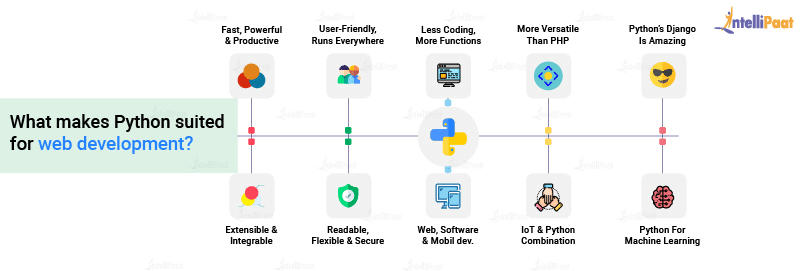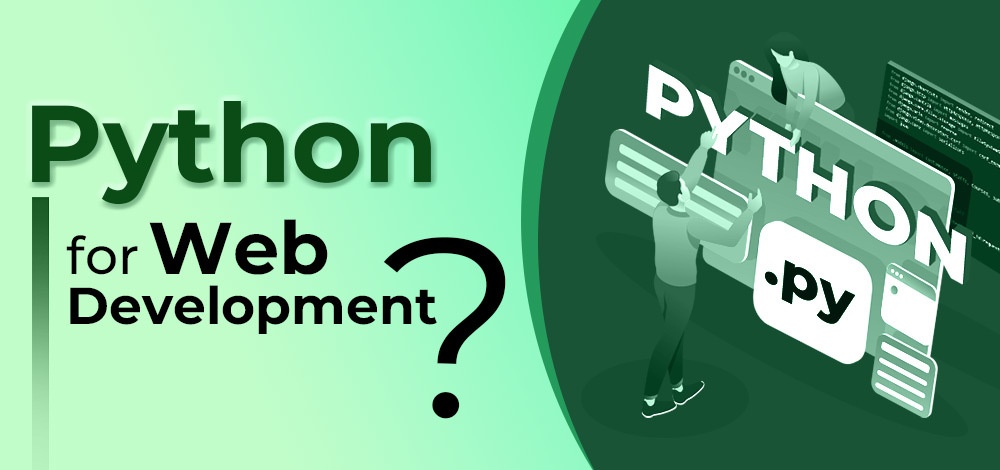Python Web Development Essentials: Python is a versatile programming language that has recently gained immense popularity. With its simplicity, readability, and powerful frameworks, Python has become a top choice for web development. This comprehensive guide will explore the world of Python web development, including its benefits, frameworks, tools, and best practices.
Benefits of Python Web Development
There are several reasons why Python is widely used for web development:
- Readability: Python’s syntax is clean and easy to understand, making it ideal for beginners and experienced developers. The code is highly readable, which leads to better collaboration and maintainability.
- Large Community: Python has a large and active community of developers who constantly contribute to the language’s growth. This means plenty of resources, libraries, and frameworks are available for Python web development.
- Extensive Libraries: Python offers many libraries and modules that simplify web development tasks. Whether you need to handle database operations, process data, or implement machine learning algorithms, Python has got you covered.
- Scalability: Python is known for its scalability, allowing developers to build both small—and large-scale web applications. This makes it an excellent choice for startups and established businesses.
- Frameworks: Python has several powerful frameworks that streamline web development. These frameworks provide pre-built components, routing systems, and other tools that simplify development and enhance productivity.

Credit: intellipaat.com
Python Web Development Frameworks
Python offers a variety of frameworks that cater to different web development needs. Let’s take a closer look at some of the most popular Python web development frameworks:
1. Django
Django is a high-level Python web framework that follows the model-view-controller (MVC) architectural pattern. It is known for its simplicity, scalability, and robustness. Django has many built-in features, including an ORM (Object-Relational Mapping) system, authentication, and an admin interface.
With Django, developers can quickly build secure and maintainable web applications. It provides excellent documentation, a strong community, and a vast ecosystem of reusable packages.
2. Flask
Flask is a micro web framework that is lightweight and easy to learn. It is designed to be simple and flexible, allowing developers to choose the necessary components. Flask provides basic functionality for building web applications, and developers can easily extend it by adding additional libraries.
Flask is an excellent choice for small—to medium-sized projects. It offers a minimalist approach and encourages code simplicity. It is highly customizable and provides great flexibility for developers.
3. Pyramid
Pyramid is a full-stack web framework that focuses on flexibility and performance. It follows the principles of simplicity, minimalism, and ease of use. Pyramid is suitable for both small and large-scale applications and provides a robust architecture for building complex web systems.
Pyramid is known for its extensibility. It allows developers to integrate third-party libraries and components quickly and provides excellent URL routing, authentication, and database integration support.
4. Bottle
Bottle is a simple, lightweight web framework for small projects and APIs. It has minimal dependencies and a small codebase, making it easy to understand and use. Bottle is known for its simplicity and ease of deployment.
Despite its small size, Bottle provides many features, including routing, templating, and session management. It is an excellent choice for developers who prefer simplicity and want to build small web applications quickly.
Tools for Python Web Development
In addition to frameworks, Python web development relies on various tools that enhance productivity and streamline the development process. Let’s explore some of the essential tools:
1. Virtualenv
Virtualenv is a tool that creates isolated Python environments for projects. It allows developers to work on multiple projects with different dependencies without conflicts. Virtualenv is crucial for managing dependencies and ensuring project stability.
2. Pip
Pip is the Python package installer. It allows developers to easily install, upgrade, and manage Python packages. Pip is widely used in Python and provides access to thousands of open-source packages.
3. Git
Git is a distributed version control system widely used in web development. It allows developers to track changes, collaborate with others, and easily revert to previous versions. Git provides excellent support for managing code repositories and is essential for maintaining code quality and version control.
4. Pycharm
PyCharm is a popular integrated development environment (IDE) for Python. It provides comprehensive features, including code completion, debugging, and version control integration. PyCharm improves developers’ productivity by providing an intuitive and powerful environment for Python web development.

Credit: www.geeksforgeeks.org
Best Practices for Python Web Development
To ensure the success of your Python web development projects, it is essential to follow best practices. Here are some tips to keep in mind:
1. Use Virtual Environments
Always use virtual environments to isolate project dependencies and prevent conflicts. Virtual environments allow you to manage packages and dependencies specific to each project.
2. Follow Pep8 Guidelines
PEP8 is the official style guide for Python code. Following PEP8 guidelines ensures the consistency and readability of your code. It helps improve collaboration and maintainability of your projects.
3. Use Orm For Database Operations
When working with databases, use Object-Relational Mapping (ORM) libraries like Django ORM or SQLAlchemy. ORM simplifies database operations by allowing you to work with objects instead of writing raw SQL queries.
4. Implement Caching
Implement caching to improve the performance of your web applications. Caching reduces the load on the server by storing frequently accessed data in memory, resulting in faster response times.
5. Implement Security Measures
Web security is crucial for protecting your applications and users’ data. Implement security measures such as input validation, proper authentication, and protection against common vulnerabilities like cross-site scripting (XSS) and SQL injection.
6. Write Unit Tests
Unit tests are essential for ensuring the reliability and correctness of your code. Write unit tests for critical parts of your application to catch bugs early and maintain code quality.
Frequently Asked Questions
What Is Python Web Development?
Python web development refers to creating web applications and websites using Python programming. Python’s simplicity and versatility make it a popular choice among developers for building robust and scalable web solutions.
Why Is Python Preferred For Web Development?
Python is preferred for web development due to its simplicity, readability, and extensive library support. It offers a wide range of frameworks, such as Django and Flask, that streamline the development process, making it efficient and productive.
What Are The Advantages Of Using Python For Web Development?
Python for web development offers several advantages, including rapid growth, clean and maintainable code, strong community support, and seamless integration with other technologies. Python’s extensive libraries also enable developers to effortlessly add various functionalities to their web applications.
Which Python Frameworks Are Commonly Used For Web Development?
The most commonly used Python frameworks for web development are Django and Flask. Django is a high-level framework that follows the model-view-controller (MVC) architectural pattern, providing a comprehensive set of tools and libraries. On the other hand, Flask is a micro-framework that offers simplicity and flexibility, making it ideal for small-scale projects and APIs.
Conclusion
Python web development offers a powerful and versatile platform for building web applications. With its simplicity, extensive libraries, and robust frameworks, Python has become a top choice for developers worldwide. By following best practices and utilizing the right tools, you can leverage the full potential of Python for your web development projects.


